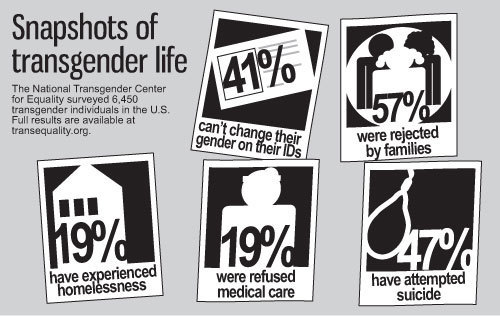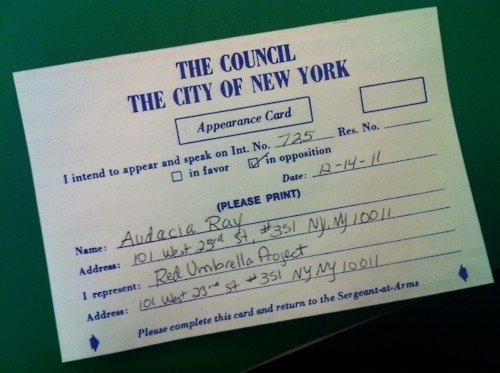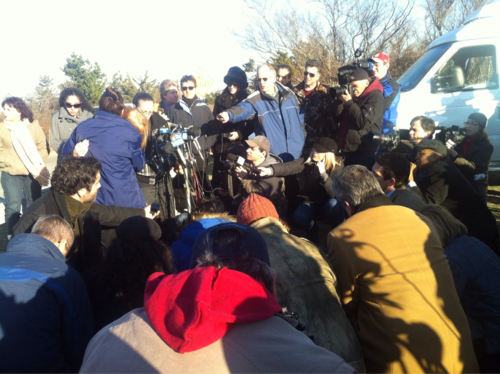Audacia Ray's Blog, page 39
December 20, 2011
flapjackstate:
[image: an infographic titled Snapshots of...

[image: an infographic titled Snapshots of transgender life that says 41% can't change their gender on their IDs, 57% were rejected by families, 19% have experienced homelessness, 19% were refused medical care, 47% have attempted suicide. Source is available at transequality.org].
December 18, 2011
(via Sex violence victims are honored by vigil)]
Newsday photo...

(via Sex violence victims are honored by vigil)]
Newsday photo slideshow of our International Day to End Violence Against sex workers event yesterday.
Really good accompanying article here. Avoid the comments section.
December 17, 2011
December 16, 2011
Job opening at International Women's Health Coalition
Interested in being a professional feminist, even with all its problems and frustrations? (by which I mean both the traditional opposition and the massive problems withing institutional feminism). The org I work part time for as the Program Officer of Communications, the International Women's Health Coalition, is hiring a Program Assistant for the Communications and Policy Program - you'd be in our NYC office. So you'd work closely with me, plus some other badass cis women. We work on sexual and reproductive rights and health, with partners in Asia, Africa, and Latin America, as well as with folks in DC and at the international level at the United Nations.
Here's the gist of the job - full description and application info here. Email me at aray@iwhc.org if you have questions.
PRIMARY PURPOSE & FUNCTION
Ø Provide administrative and programmatic assistance to the Advocacy and Policy Program, including communications, international policy and in-country support functions.
Ø Maximize IWHC's capacity to provide professional and advocacy assistance, technical resources and information for colleagues and projects in the region, while also helping to cultivate IWHC's brand through communications activities and social media presence.
DUTIES & RESPONSIBILITIES
Advocacy and Policy
Ø Review and analyze briefs, policy documents, and other publications through the lens of sexual and reproductive rights and health of women and young people.
Ø Manage and maintain relevant portions of IWHC programmatic databases and accurate and organized file systems.
Ø Handle routine telephone and email communications, including with colleagues overseas; screen and organize mail and materials in order of priority.
Ø Arrange travel and accommodations for staff and for relevant colleagues, including assistance in obtaining visas, outlining itineraries, sending advance materials, etc.
Ø Assist in organizing special meetings or conferences; set up and implement necessary systems, take meeting minutes and provide other support.
Ø General office administrative tasks, including, but not limited to, photocopying, filing, handling routine written and telephone communications, and keeping databases updated.
Communications
Ø Assist in keeping IWHC's multilingual website, blog, email blasts, and social media accounts dynamic and up-to-date, including creating new content. Upload text and photos; assist in compiling statistics and analyzing web traffic.
Ø Provide accurate, relevant information for IWHC publications, articles, speeches, factsheets, and media work. Monitor and collect technical publications on IWHC's key issues. Track and disseminate opportunities for IWHC submissions to journals or participation in conferences and events. Monitor appropriate listservs.
Ø Act as the first line of support for all media inquiries: collect initial information from journalists, field interview and speaker requests to IWHC staff and colleagues; coordinate and document subsequent follow-up
Ø Conduct research for and assist in drafting letters to the editor, op-ed pieces, news releases, editorial memos, and briefing materials. Assist in identifying media contacts and new opportunities for work with the media.
Ø Compile and maintain resource files for institution (including communications activities, media clips and photographs). Maintain inventory of IWHC publications and respond to requests.Keep track of subscriptions to journals.
Ø Coordinate requests for sign-ons received by IWHC staff.
December 15, 2011
End Violence Against Sex Workers
[image error]
Info about the NYC event here. Info about events around the US and internationally here.
I'm contemplating my speech for Saturday, so I went back and read the speeches I gave the last three years.
2010:
Violence is being called a whore by an intimate partner who is ashamed of what you do. Violence is when the media ungenders you and uses your birth name because you are a woman and trans. Violence is when your client demands sex without a condom, and you comply because you're afraid what he'll do if you don't. Violence is when you don't want to be a sex worker at all, but it is the highest paying work you can find. Violence is when you are denied access to public housing because you have a prostitution conviction. Violence is when child services deems you an unfit parent because you are a sex worker. Violence is when an entire country -this one- denies you entry because you have been a sex worker or a drug user. Violence is when you are a minor and are treated as a victim, no matter what you say about your experience. Violence is when you are "rescued," forced into a rehabilitation program, and given a sewing machine so you can lead a more honorable life working in a sweat shop. Violence is when the country you live in doesn't treat you like a full citizen, but instead regards you as a criminal - and all because you are trying to make a living.
2009:
The night that reports of Julissa's [Brissman, murdered by Phillip Markoff, the "Craigslist Killer"] death reached me, I watched a flurry of messages roll through my email inbox and get posted online that said things like "Be careful out there!" and "Girls, do your screening!" And though I'm a strong believer in personal agency and safety and we all know that there are things that sex workers can do to stay safe, sane, and healthy – it's not Julissa's fault that she was killed. Taking safety measures and being on the defensive is a band aid, it is not a long term solution. We cannot stop violence against sex workers by ourselves. We need the support and participation of a culture that sees us as human beings – we are your mothers, sons, cousins, friends – who are worthy of living lives of dignity that are free of violence.
2008:
In a minute we'll read the SWOP demands for ensuring justice and safety for sex workers, but I also wanted to add in my very own demand - and it's not directed to policy makers, health care providers, law enforcement, or any other official organization. It's directed to the people standing right here today. My demand is this: take care of yourselves, ask for help when you need it, and offer support to others when you can. And by support, I mean the purest and most human form of support - listen to sex workers and allies about their experiences, their struggles, their doubts. It's true that we have a lot of work to do, and sex workers are dying while we're trying to do that work. But it's also true that we can't be of service, we can't fight the good fight, if we don't take care of ourselves and each other.
December 14, 2011
Just a comment: I'd be cautious about posting an image of your City Council speaker card that lists your address. Thanks for all your great work, though!
Thanks for the concern - its not my home address, its the public address of my org's mailbox.
This morning I testified at a New York City Council joint...

This morning I testified at a New York City Council joint hearing of the Transportation and Women's Committees, about Intro 725, a piece of legislation that would penalize taxi and car service drivers for transporting prostitutes. Or at least, that's what the text of the bill says. Anti-trafficking advocates have used it to advocate for penalties for drivers who knowingly participate in trafficking rings as mobile pimps. All the testimony given by anti-trafficking groups, especially Sanctuary for Families, was about drivers who are pimps and work with trafficking networks to drive (what they assume are cis female) victims around [link goes to a NYT article about the issue]. The bill is not this specific, though, and includes language penalizing drivers for "promoting prostitution" (which btw is already illegal) with no mention of trafficking. So there's just this tangling and jumbling of trafficking and prostitution, while the law will encourage profiling and have a chilling effect on drivers who might otherwise help a sex worker who needs it. Favorite moments of the hearing included when Council member Dromm asked Taxi and Limo Commissioner Yassky to define the difference between sex trafficking and prostitution, and he couldn't do it. I also was a fan of the cab driver who said that if drivers should be profiling anyone, they should be profiling Wall Street executives, because they are the real criminals in this city.
I was proud to testify alongside a trans latina woman from PRYDE, a young gay man from GLOBE, and a lawyer from the Sex Workers Project. They all did great jobs complicating matters and steering the conversation away from omg trafficking is the worst, we must do all we can to eradicate it even if it makes no sense or mows down human rights.
Anyway, here's part of my testimony:
I understand that the work I used to do is illegal under New York law. But no driver ever participated in my business transactions—as client, manager, or even paid security. They did their job as they would for any other New Yorker, not unlike the bus driver or the subway driver did when I chose those modes of transportation to meet a client, who was often located in the Upper East or Upper West Sides of Manhattan. There is a great deal of difference between a taxi or limousine driver who I call for a ride and pay the usual fare and tip to, and the imagined driver who is part of the management structure of an illegal escorting business—but Intro. 725 can offer no distinction between the two. 'Promoting prostitution' has always been interpreted broadly.
Even if the bill could make such a distinction, the fact remains that punishing drivers for transporting sex workers will (as is intended) make them hesitant to transport anyone perceived to be a sex worker. And how are they to know? No one ever guessed my job: I'm white and prefer a business-casual attire. When sex workers are profiled for, let us remember that it is always people of color and transgender people who suffer, many of whom are not sex workers.
Drivers can play a key role in keeping sex workers safe, and their presence and concern was greatly appreciated when my safety was on the line. Many New Yorkers use car services or taxis, particularly late at night, and in order to be safer, as they should. Our mothers taught us to do this—out of love and concern for our well-being. And our safety should be the Council's priority too.
December 13, 2011
"Sofia, a sweet-voiced and cherubic 24-year-old, was one of the lucky ones: She managed to escape..."
Sofia, a sweet-voiced and cherubic 24-year-old, was one of the lucky ones: She managed to escape much of the suffering shared by the millions of sex workers trafficked throughout the world, and even saw two of her traffickers forced out of the country and back to Mexico.
But the young woman said she still feels that complete justice has eluded her, because the drivers who ferried her from john to john, her de facto bosses, remain at large.
"-
Council to Seek Penalties For Prostitutes' Drivers - NYTimes.com
I am also testifying at this hearing tomorrow, from my perspective as a sex worker who has been assisted and protected by drivers.
Should be interesting to see what the trafficking victims vs sex workers tension looks like. Such a thorny thing.
Media swarming families of victim's of Long Island serial...

Media swarming families of victim's of Long Island serial killer at today's vigil at Gilgo beach. I want to say something smart about this-all, but I'm just tapped out. An 11th body was discovered this morning, assumption is that it's Shannan Gilbert, the woman whose disappearance sparked the search that turned up the other 10 bodies. As we drove away from the site, we saw four wooden crosses, handpainted with the names of the four cis women found along this stretch of beach. There are six more, one identified as Jessica Taylor, whose parts have also shown up in a different location. Among the five unidentified bodies are a toddler and a trans woman.
December 12, 2011
The Trans Women's Anti-Violence Project: Acknowledging the Death of an Unknown Trans Woman Killed by Long Island Serial Killer
The bodies of women have been turning up for a year now on Gilgo Beach in Long Island. These women are the victims of a serial killer who has been using the remote shore as a dumping ground. A total of 10 bodies have been discovered since the first four women's remains were found on the overgrown beach last December. The killer has specifically targeted women who were selling sexual services.
What we're not hearing much about is the one of those who was killed was a trans woman. This Asian woman has been misidentified by the police and media as a "man wearing women's clothing," and otherwise constantly misgendered. Since she was presenting herself as female at the time of her death, and all the other victims have been women, the Trans Women's Anti-Violence Project believes it is appropriate to recognize this victim as a woman.
While the police and media fail to correctly identify her (if they acknowledge her at all), this unknown woman also hasn't been recognized by the trans community. For instance, she is not listed on the Transgender Day of Remembrance website, which keeps track of murder trans people. So it's no surprise if she wasn't remembered at any of the memorials and vigils that were held last month.
What is most obvious is that this woman was not so much targeted for being trans, as she was for being a sex worker. Trans women are disproportionately represented in sex work. According to the report "Injustice at Every Turn," 15% of trans woman have done sex work. For comparison, that same report notes that one percent of cis women have done sex work.
The Trans Women's Anti-Violence Project is a co-sponsor of NYC's International Day to End Violence Against Sex Workers even on December 17.




